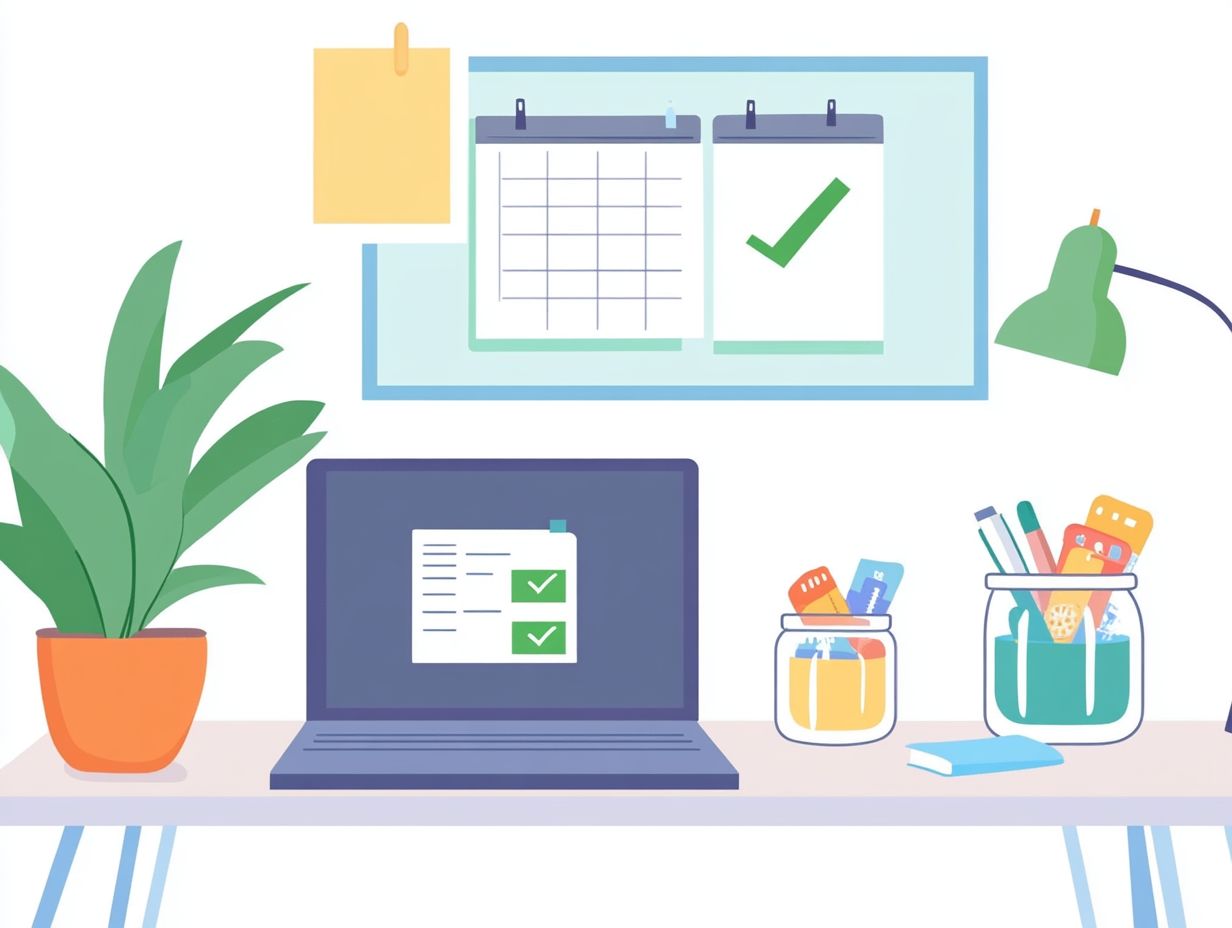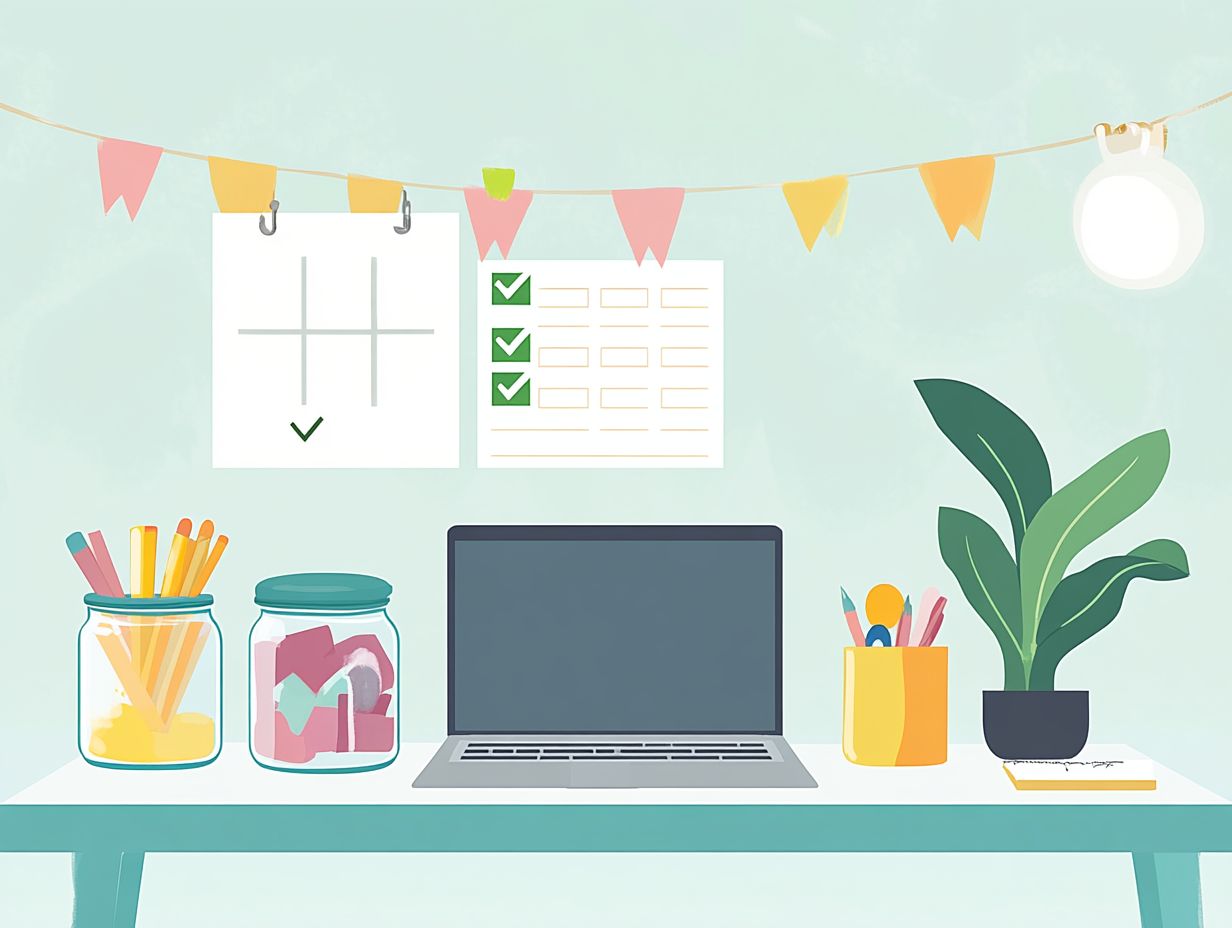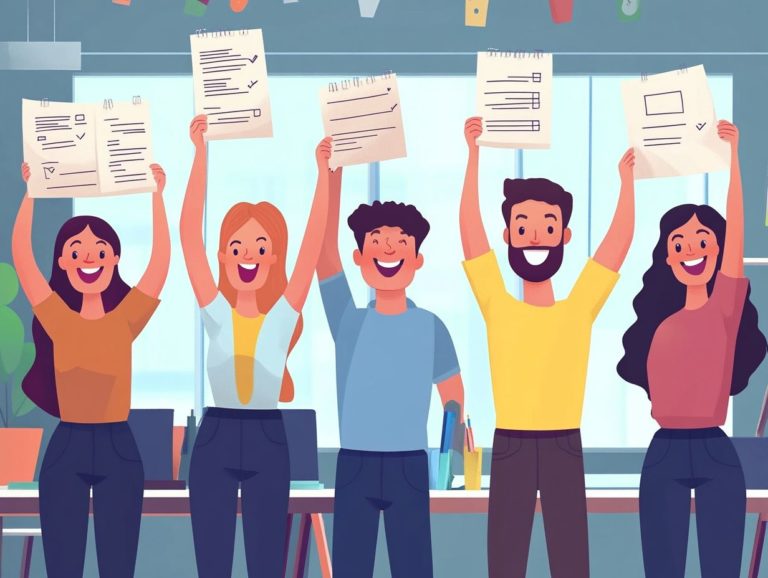How to Use Rewards to Fight Procrastination
Procrastination is a familiar hurdle that can derail your productivity. It can also cultivate frustration.
Understanding the underlying reasons for your procrastination is the crucial first step in conquering this challenge. This article delves into the significant role of rewards in enhancing your motivation. It presents practical strategies for seamlessly integrating them into your daily routines.
Whether you lean towards personal rewards (intrinsic) that fulfill aspirations or external rewards (extrinsic) that offer validation, you will uncover effective methods to establish a reward system that keeps you focused and engaged. It will also address how to navigate setbacks and sustain motivation over the long term.
Ready to supercharge your productivity? Let s jump in!
Contents
- Key Takeaways:
- The Science Behind Procrastination
- The Role of Rewards in Motivation
- Types of Rewards to Use
- Implementing Rewards in Your Routine
- Stay Motivated and Overcome Challenges
- Frequently Asked Questions
- What are rewards and how can they help me fight procrastination?
- How do I choose the right rewards for myself?
- Can rewards actually help me overcome procrastination?
- What are some examples of rewards I can use to motivate myself?
- How do I make sure I stick to using rewards to fight procrastination?
- Is it possible to use rewards as a long-term solution for procrastination?
Key Takeaways:

- Rewards can be powerful motivators in fighting procrastination by tapping into the brain’s pleasure centers and creating positive associations with tasks.
- Both personal rewards and external rewards can be effective, but finding the right type of reward for each individual is crucial for long-term success.
- Implementation is key. Creating a structured reward system and incorporating rewards into tasks can help overcome challenges and maintain motivation in the face of setbacks.
The Science Behind Procrastination
Procrastination is a nuanced phenomenon that often arises from a web of psychological and emotional factors. It presents a persistent challenge for those striving to enhance their productivity.
Research reveals that procrastination is not simply a sign of laziness; it is, in fact, a learned behavior shaped by stress, self-criticism, and emotional responses.
By diving into the science behind procrastination, you can gain valuable insights into the workings of your mind, particularly in how you navigate tasks and manage your emotions concerning task completion.
Understanding the Root Cause
Understanding the root cause of your procrastination demands some introspection, along with a willingness to face the self-criticism and emotional hurdles that often come with task avoidance.
You may find yourself caught in a cycle of delaying important tasks, driven by deep-seated fears or anxieties.
By utilizing cognitive behavioral therapy, you can start to identify and reshape those harmful thought patterns that fuel your procrastination.
Self-compassion is crucial on this journey; it gives you the power to treat yourself with kindness. This creates an environment to acknowledge your struggles without judgment.
Pairing this approach with effective stress management techniques, like mindfulness practices or physical exercise, can further alleviate the underlying pressures that contribute to this habit.
In doing so, you pave the way for a more productive and fulfilling life.
The Role of Rewards in Motivation
Implementing a rewards system is crucial for boosting your motivation and encouraging task completion, helping you reduce those procrastination tendencies.
This approach resonates with the principles of positive psychology, which highlight the importance of emotional rewards in reinforcing productive behaviors.
By recognizing and celebrating your achievements, you cultivate an environment that fosters progress and fulfillment.
How Rewards Can Help Fight Procrastination
Rewards can be powerful motivators, transforming your task completion process into a more enjoyable experience while effectively using gamification to overcome procrastination.
By integrating well-thought-out incentives, you can cultivate a consistent drive to meet your goals. For example, breaking a larger project into smaller milestones allows you to implement both tangible rewards, such as treating yourself to a favorite snack after conquering a challenging segment, and emotional rewards, like savoring a moment of relaxation with a good book or indulging in a favorite show.
These strategies reinforce your sense of achievement and make the process feel less daunting. Over time, this approach can significantly reduce procrastination habits. Each completed task brings a sense of fulfillment, creating a positive feedback loop that fosters a more productive mindset.
Types of Rewards to Use

Grasping the various types of rewards is essential for crafting effective motivation strategies. Intrinsic rewards are about personal satisfaction, while extrinsic rewards are external rewards like money or grades. Both types fulfill distinct roles in the goal-setting process.
Intrinsic rewards stem from within like that satisfying sense of personal accomplishment and stand in stark contrast to extrinsic rewards, which include tangible incentives.
Both types can profoundly influence not only productivity but also emotional well-being. Understanding this dynamic allows you to harness the full potential of motivation in your endeavors.
Intrinsic vs. Extrinsic Rewards
Intrinsic rewards come from within you, springing from personal satisfaction and achievement. On the other hand, extrinsic rewards are the tangible benefits you receive from external sources. Both significantly shape your motivation.
Grasping the difference between these two types of rewards is crucial for understanding their psychological effects. When you re intrinsically motivated, you often find joy in the process itself. This can spark higher creativity and a deeper commitment to your tasks. For instance, a student who studies biology purely out of interest might dive into the subject, cultivating long-term engagement and a love for learning.
Conversely, when you lean on extrinsic rewards like grades or monetary bonuses your motivation may shift outward. This can lead to procrastination if those rewards aren t immediately visible. An employee chasing a quarterly bonus might postpone tasks until the last minute, focusing solely on the reward rather than the work itself. This dependence can create a delicate cycle where the absence of external incentives results in decreased motivation, leaving you in a bind.
Examples of Effective Rewards
Using the right rewards can supercharge your motivation and transform tasks into enjoyable endeavors. To further enhance this process, learn how to use visualization to overcome procrastination, ultimately leading to heightened productivity and diminished procrastination.
Don t wait start with simple acknowledgments, such as offering verbal praise or sending a quick thank-you email. These small gestures can significantly lift morale and encourage ongoing effort.
You can increase your effectiveness by introducing substantial incentives, such as gift cards, to encourage timely completion of tasks or bonuses for surpassing targets.
Productivity strategies, such as breaking tasks into smaller, manageable chunks, can help sustain your momentum. Treat yourself with breaks or personal rewards upon completion. Don t underestimate the power of emotional rewards, too. The satisfaction of crossing an item off your to-do list, or the pride from completing a challenging project, can be immensely fulfilling. This nurtures a profound sense of accomplishment that ignites your motivation and engagement.
Implementing Rewards in Your Routine
Successfully incorporating a rewards system into your daily routine demands careful planning and seamless integration. It s essential that the rewards you choose align with your personal goals and strategies for completing tasks.
By establishing this system, you can cultivate habits that not only boost your productivity but also help combat the urge to procrastinate.
Creating a Reward System
To create a reward system, first identify what truly motivates you and set clear criteria for achieving those rewards. This ultimately enhances your overall drive.
By recognizing what genuinely excites and inspires you, you can tailor your rewards to align with your unique preferences and aspirations. This personalized approach fosters consistency and commitment while transforming effort into something enjoyable.
As you progress, each milestone becomes a stepping stone toward greater productivity. Breaking tasks into smaller, manageable goals allows you to celebrate minor successes, cultivating a positive feedback loop that fuels further motivation and instills a profound sense of accomplishment.
Incorporating Rewards into Tasks

Incorporating rewards into your tasks is a strategic way to keep your motivation high and ensure you complete everything on your to-do list. This transforms the entire process into a more enjoyable experience.
Thoughtfully weaving in small incentives creates a positive feedback loop that acknowledges your efforts and enhances the emotional significance of your achievements. For instance, after finishing a mundane chore, treating yourself to a favorite snack or taking a short break to indulge in a hobby can truly elevate the experience.
Celebrating milestones big or small creates a strong feeling of success. This makes it easier to tackle the next task on your list.
These emotional rewards act as powerful motivators, encouraging you to engage consistently and build a positive association with your everyday responsibilities.
Stay Motivated and Overcome Challenges
Overcoming challenges and maintaining motivation is essential for anyone seeking to break free from procrastination and achieve their goals. By recognizing potential setbacks and implementing effective strategies, you can cultivate resilience the ability to bounce back from difficulties and strengthen your commitment to self-improvement.
Dealing with Setbacks
Dealing with setbacks is an inevitable part of your journey toward overcoming procrastination. Approaching these moments with self-compassion can significantly enhance your motivation.
When challenges arise, recognize that these obstacles aren t reflections of personal failure; they are, in fact, opportunities for invaluable learning and growth. Embracing a mindset grounded in positive psychology helps you transform disappointments into stepping stones for future success.
Viewing these moments as valuable lessons encourages deeper self-reflection and ultimately fosters resilience. Employing practical strategies like reframing the narrative around a setback and pinpointing actionable steps for improvement gives you the power to move forward with renewed purpose and enthusiasm.
This shift in perspective could very well unlock lasting change and help you achieve your goals.
Maintaining Long-Term Motivation
Maintaining long-term motivation is all about setting realistic goals and continuously adapting your approach to ensure you stay engaged and make steady progress. This process establishes a clear roadmap and cultivates a rewarding sense of achievement as you reach each milestone.
When you break larger objectives into manageable tasks, you create an environment that encourages consistent effort. Regularly reflect on your progress to stay on track and motivated!
By doing this, you can effectively combat procrastination habits that often creep in when feelings of overwhelm or uncertainty arise. This fosters resilience and commitment on your journey toward personal and professional growth.
Frequently Asked Questions
What are rewards and how can they help me fight procrastination?

Rewards are incentives that can motivate individuals to complete tasks or reach goals. Using rewards creates a positive association with completing tasks and increases your motivation to overcome procrastination.
How do I choose the right rewards for myself?
The key to choosing the right rewards is to make them personalized and meaningful to you. Think about what truly motivates you and what type of reward would make you feel accomplished.
Can rewards actually help me overcome procrastination?
Yes, rewards can be a powerful tool in fighting procrastination. By setting up a reward system, you create positive reinforcement that encourages you to take action and complete tasks instead of putting them off. To further enhance your productivity, consider learning how to use a timer to combat procrastination.
What are some examples of rewards I can use to motivate myself?
Rewards can vary from person to person, but some common examples include treating yourself to something you enjoy, such as a favorite snack or activity, taking a break to relax, or even setting up a point system where you can exchange points for larger rewards.
How do I make sure I stick to using rewards to fight procrastination?
Consistency is key to overcoming procrastination with rewards. Set attainable goals and create a clear reward system. Hold yourself accountable for claiming those rewards.
Is it possible to use rewards as a long-term solution for procrastination?
Rewards can help in the short term. However, it s vital to build lasting habits and strategies to manage procrastination over time. Use rewards as a tool, but don t depend solely on them.






